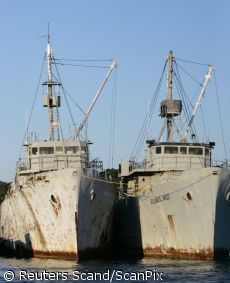For several years the position of Polish exporters on the markets of the former Commonwealth of Independent States has been clearly weakening
Published:
5 May 2003 y., Monday
In order to spur on trade, presentations of Polish exporters are gaining popularity. One such presentation is the Polish National Exhibition in St. Petersburg.
Geographic proximity, relatively small competition from local manufacturers who are not capable of satisfying the growing demand for modern products and, contrary to common belief, the increasingly wealthy and demanding customer, are the advantages of the "eastern market." Why then does trade with the countries of the Commonwealth of Independent States (CIS) constitute as little as 7.1 percent of the global value of Polish export?
The position of Polish companies is weakened by competition from the Western businesses that are perfectly aware of the perspectives which an active and strategically planned entry into Eastern markets can accomplish. Entrepreneurs from Germany, France and the United States, supported by the appropriate funds, first promote and then successfully sell their products in Russia and Ukraine or make direct investments there.
The decrease in the amount of Polish agriculture and food products exported to Eastern markets has stemmed from the fact that big international concerns such as Nestlé, Danone or Unilever directly entered this strategic area. However, the issue of Western competition is only a part of the answer to this question and the possibility of development for Polish exporters on the markets in the former Soviet Union.
One of the most serious difficulties Polish companies encounter is a considerable risk connected with signing commercial contacts with partners from the East who frequently appear to be insolvent and do not honor their contracts. According to Robert Stawski from the Promotion Chamber of the Polish Chamber of Commerce, businesspeople from Russia frequently do not understand the term "advance payment" and sometimes want to pay for the products only after they sell them. For obvious reasons, these terms are hard to accept for Polish manufacturers, which are mostly small and medium-sized companies. The state does not guarantee any protection for companies against situations in which partners from Russia, Belarus or Ukraine do not fulfill the terms of a commercial contract.
Šaltinis:
warsawvoice.pl
Copying, publishing, announcing any information from the News.lt portal without written permission of News.lt editorial office is prohibited.
The most popular articles
 The finance chiefs from the leading economies met in southern England to discuss measures to deal with the global economic crisis.
more »
The finance chiefs from the leading economies met in southern England to discuss measures to deal with the global economic crisis.
more »
 Environmental projects up for bid at ‘auction floor’ conference in Brussels.
more »
Environmental projects up for bid at ‘auction floor’ conference in Brussels.
more »
 In the United States increasing numbers of men are having vasectomies to avoid any added strain on hard-pressed finances.
more »
In the United States increasing numbers of men are having vasectomies to avoid any added strain on hard-pressed finances.
more »
 Within last year the number of settlement operations made by using AB Bank SNORAS payment cards grew by 21 per cent or twice more than on the market where 10 per cent growth was fixed.
more »
Within last year the number of settlement operations made by using AB Bank SNORAS payment cards grew by 21 per cent or twice more than on the market where 10 per cent growth was fixed.
more »
 The “Erika III” package, aimed at protecting Europe's coasts from maritime disasters and improving passenger and crew safety, was adopted by Parliament on Wednesday.
more »
The “Erika III” package, aimed at protecting Europe's coasts from maritime disasters and improving passenger and crew safety, was adopted by Parliament on Wednesday.
more »
 Improving the transparency and the supervision of the financial system to ensure proper risk management in the banking sector is the aim of legislation approved on Monday by the Economic and Monetary Affairs Committee.
more »
Improving the transparency and the supervision of the financial system to ensure proper risk management in the banking sector is the aim of legislation approved on Monday by the Economic and Monetary Affairs Committee.
more »
 MEPs could back speeding up the rate at which Europe's regional funds are made available.
more »
MEPs could back speeding up the rate at which Europe's regional funds are made available.
more »
 The Commission has taken a humanitarian decision for €700,000 to provide assistance to communities affected by floods in Fiji, the Solomon Islands and Papua New Guinea.
more »
The Commission has taken a humanitarian decision for €700,000 to provide assistance to communities affected by floods in Fiji, the Solomon Islands and Papua New Guinea.
more »
 The international business magazine Euromoney has announced the results of its Private Banking Survey 2009, and Parex banka has received the award for “Best Private Banking Services Overall” in Latvia.
more »
The international business magazine Euromoney has announced the results of its Private Banking Survey 2009, and Parex banka has received the award for “Best Private Banking Services Overall” in Latvia.
more »
 Mass layoffs and inflation are pushing people to seek food aid.
more »
Mass layoffs and inflation are pushing people to seek food aid.
more »